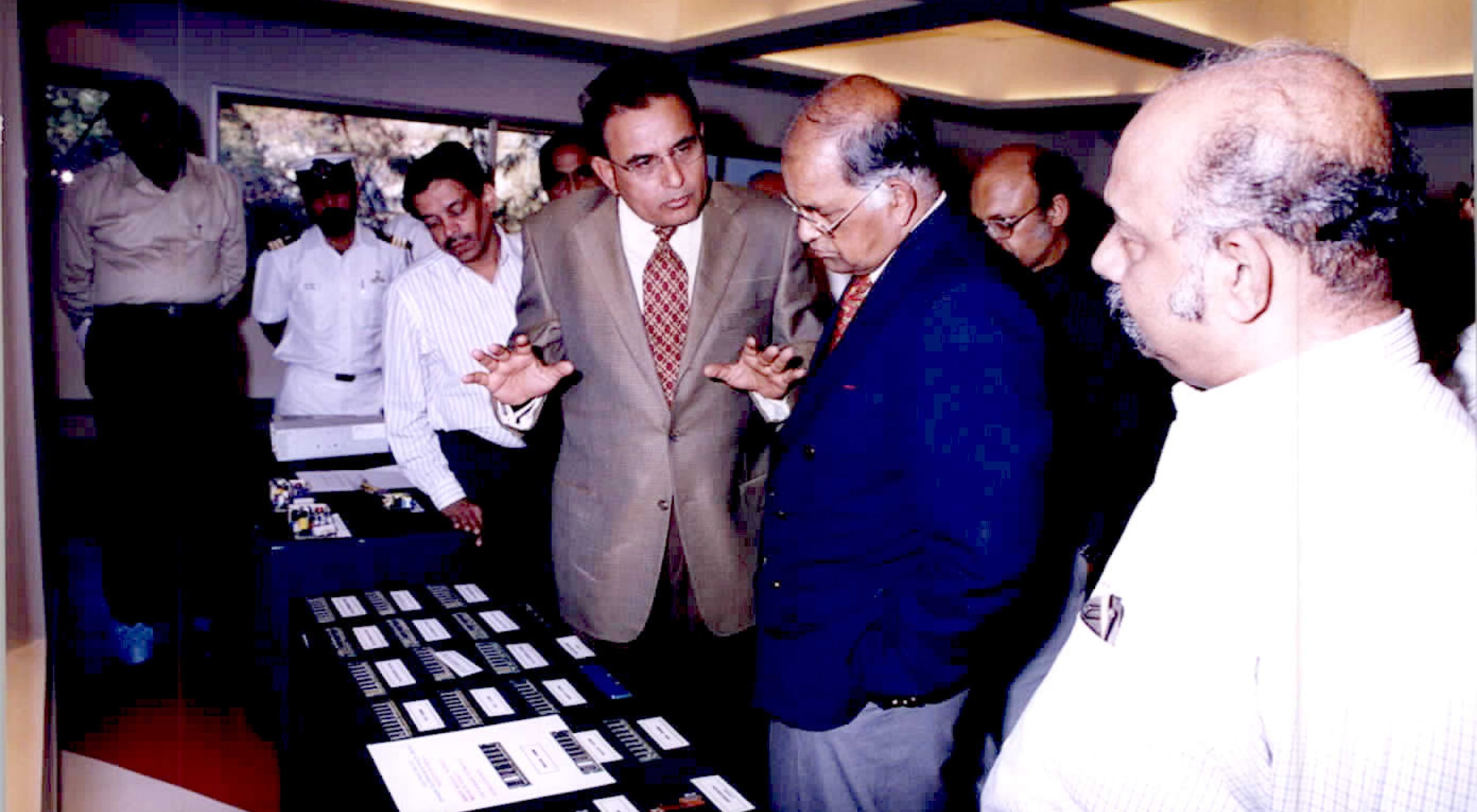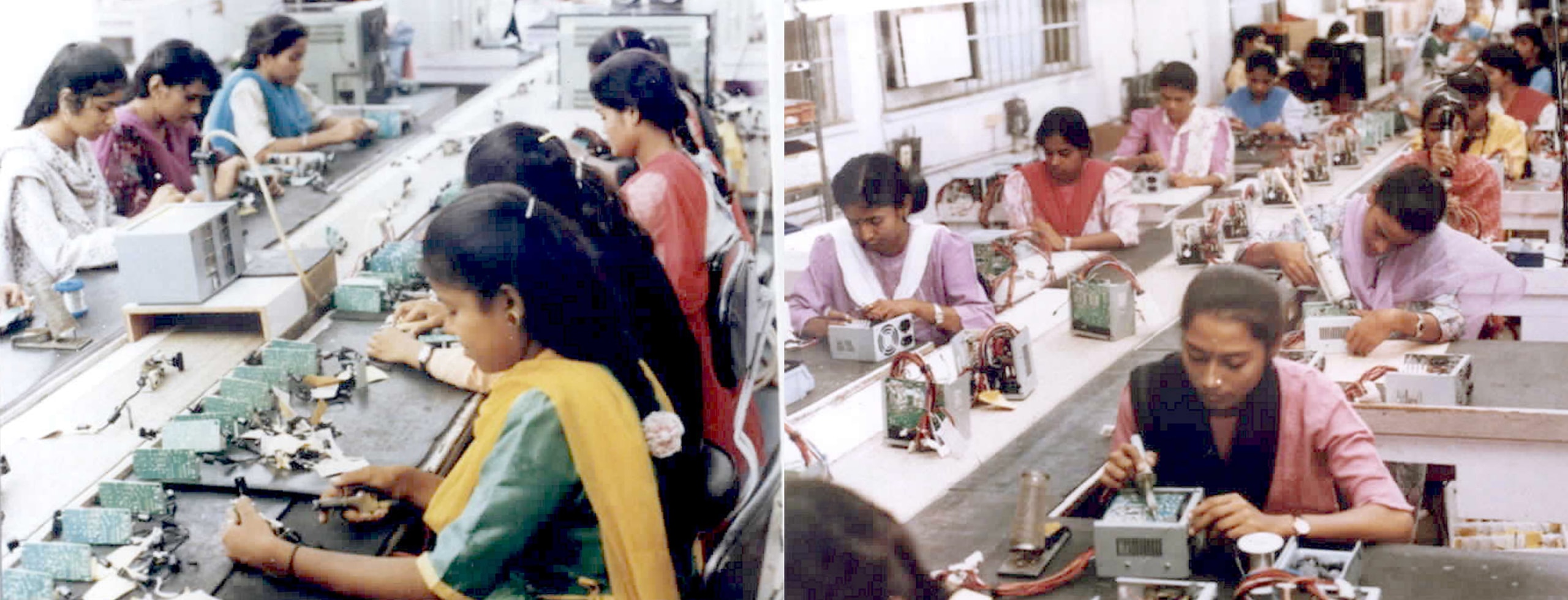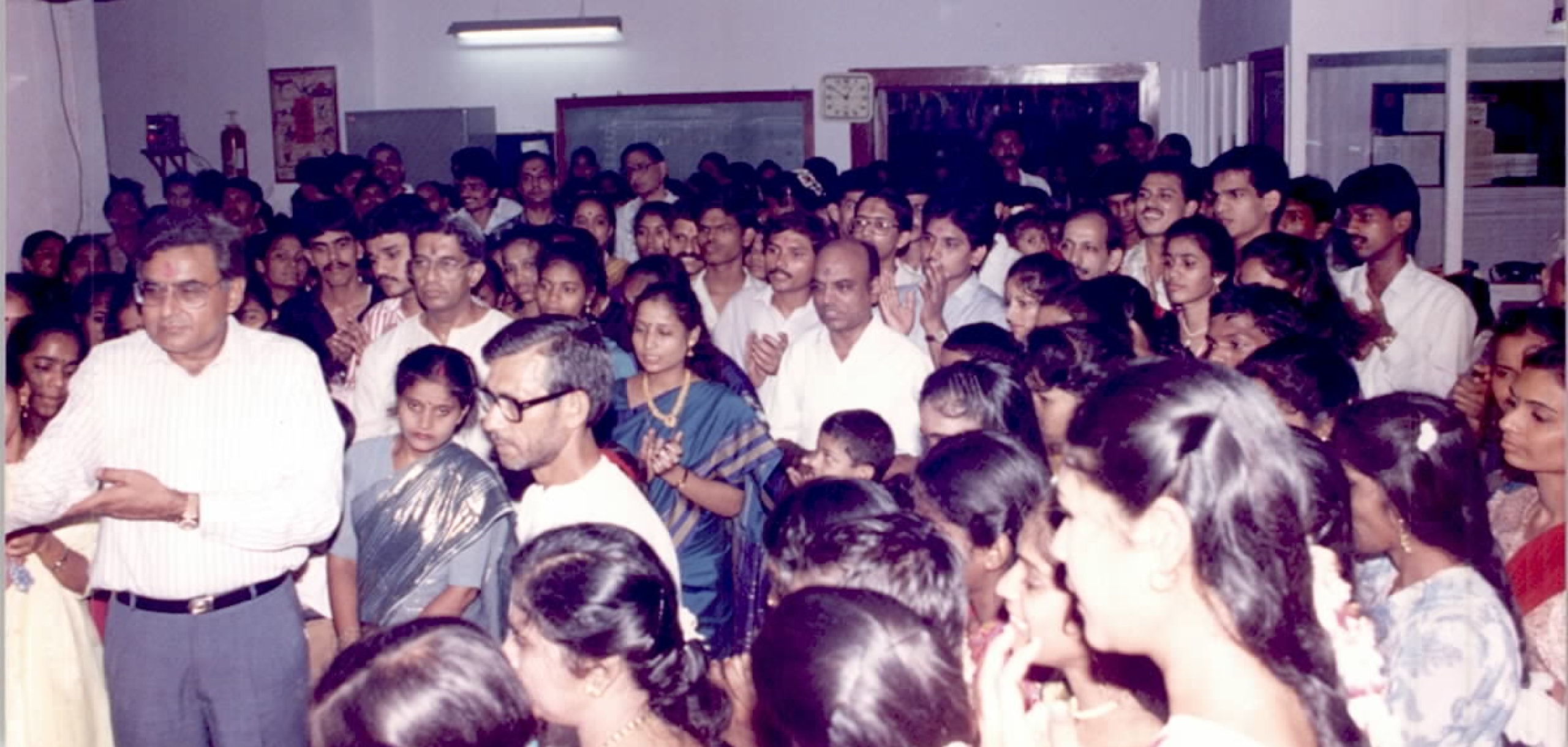Founder Story
From Barnala, India to a global change catalyst.
More Than A Portrait
Every year at Tandon Group in Mumbai we hosted an exhibition where we featured art created by our employees. One year, a female employee made a picture of a sick man lying on a cot. He was surrounded by three children sitting on the floor with a big Thali, or platter. The man was skin and bones, you could actually see his ribs, and the Thali had no food on it. The words on the picture said “I wish I had a son,” inferring that a son could probably earn a few bucks by doing odd jobs.
Then this employee displayed another picture. One that showed the man and children happy and with plenty of food. The words on the second picture said “I don’t need a son because my daughter works at Tandon.”
To understand the significance of that moment, you need to understand mid-20th century India.
From India To America
When I was a boy, a religious leader named Swami Ganesh Dutt visited our hometown of Barnala. He met with my father and told him “I think you need to start a school here.”
My father was a famous criminal lawyer at the time, and had never taught or run a school. He looked at Swami Ganesh Dutt and said, “I don’t know anything about a school but if you want me to argue someone’s case and save his life, that I can do.” Swami insisted, “I trust in you. You can do it.”
My father was influential in the community so he went to the city grain market and told the merchants that he was starting a school. He convinced them to contribute 1% of their daily sales in the grain market to help pay for the room he rented to conduct school activities. As time went on the school became successful enough that my father eventually converted it into a college.
I remember the day I left India to pursue my Masters degree in engineering at Purdue. As my brother and I climbed the steps to the airplane, my father pulled me aside and said, “Don’t do anything that would give you, me, or your country a bad name. The rest of you is free.”
It was a liberating moment, knowing I had his blessing to think and do differently, as long as I did something for the higher good.
It was exciting to be in America in the 1960s. Even though it was a big cultural change, having the opportunity to live in a prosperous country and work for multinational titan IBM exposed me to higher standards and a bigger vision of what could be possible for India. Family business made up the Indian economy at the time.
Normally the father would give the family business to the son and so on. My father broke that tradition when he quit engineering college to become a lawyer and like him, I yearned to forge my own path. My father was an independent and forward-looking man and his example and wisdom, coupled with the opportunity to study and work in America, set the foundation for the journey I was about to embark on.
When I was getting my MBA at Santa Clara University, I wrote my thesis about what I wanted to accomplish with my life. Basically my plan boiled down to . . . work for IBM, go back to India and start my own business. And I got what I wanted.
But not exactly the way I thought I’d get it and certainly not without challenges.

Resourceful Pathways
I remember when I interviewed with IBM, I met with five departments in a day before I spoke with the personnel manager. His name was Ron Gertz and after the meetings he said, “Mr .Tandon all the departments like you but we can’t offer you a job.” and I said, “Mr. Gertz, I’m not asking for all five. Just give me one!”
Why couldn’t they hire me? No green card.
For a progressive, international company like IBM this seemed like nonsense to me so I kept interviewing and got another offer with NCR.
That night, I got a call from Ron Getz. “Don’t take the other job, please don’t for God’s sake.” When Ron’s boss, Mr. Webster, heard why I didn’t get the job he told Ron, “No green card? Dammit, get it.”
So I worked for IBM Development Lab in San Jose as an engineering manager and learned so much about designing, reliability and quality. In 1967, I joined IBM India and worked in manufacturing for nine years until IBM was asked to leave because of non-compliance with Indian Equity norms. IBM was forced to close the plant in 1977. Now what?
I proposed along with some other key ex-IBMers to take over the IBM plant. IBM accepted the proposal to give us all assets at the cost of 10 cents to a dollar as long as we employed all who had been working in the factory. So we created a company called Pentax Engineering to provide products for the local market in India.
At the same time, I started Tandon Magnetics India to manufacture and export magnetic heads to Tandon Magnetics USA, founded by my brother Sirang Lal Tandon.
But before Tandon could become the preferred supplier for IBM’s floppy disk drives, we had to overcome three significant challenges — hiring dedicated labor, producing high-quality components and dealing with government regulations.
The Little Things
I remember when I interviewed with IBM, I met with five departments in a day before I spoke with the personnel manager. His name was Ron Gertz and after the meetings he said, “Mr .Tandon all the departments like you but we can’t offer you a job.” and I said, “Mr. Gertz, I’m not asking for all five. Just give me one!”
In the 1970s, dedicated labor was hard to find. The men who typically filled entry-level assembly positions would hop from town to town in search of other options. The costs of constantly training new workers added up quickly. So I wouldn’t hire men. They could find jobs anywhere.
Women, on the other hand, were legally prohibited from working at night. Families often didn’t want them to work because of cultural reasons and no jobs were available to them anyway. But I saw these young, unmarried women as an untapped pool of industrial talent so I hired an all-female electronic assembly team. These women delivered a strong work ethic, loyalty and superior manual dexterity for high-precision electronics assembly.
India also had a reputation at the time for not producing products that met international standards. Indian engineers and workers had no knowledge of the technology standards for the floppy recording heads and drives we were manufacturing, which presented a great challenge for us. Instead of trying to re-train the existing labor pool to learn new ways of working under a microscope to assemble small, intricate electronic components, we hired high school graduates and drop outs. With no prior training, they were easier to train and eager to learn how to produce products to international standards from the outset.
When I opened Tandon’s Mumbai plant in 1978 training the workforce was my top priority because I saw first-hand how corporate efficiency and flawless quality put IBM at the top of the global market. That’s what I wanted for Tandon, but in India we have something called “chalta hai”— meaning “it’s good enough” or “the little things don’t matter.” But I know the little things do matter and whenever I was on the production floor I would tell the workers “Chalta hai, nehi!” — Chalta hai is not okay!
The other thing I learned at IBM is respect for the individual, which was uncommon in India at that time. It was a British System and workers were treated differently from managers. At IBM I learned that no matter how big or small the job is, the individual is important. So I had an open door policy and any employee with any problem could speak with me and I would listen and try to solve it.
For me, quality meant continuous improvement and the best way to accomplish that was to instill a sense of empowerment and respect at all levels. I wanted my workers to feel like Tandon was just as much their company as it was mine. As a result, Tandon was the only company in India that did not have a union because the workers did not want it.

Overcoming Obstacles
Government regulation and getting things done was the third major challenge for Tandon. So much of my time was spent dealing with the government to understand the customs, regulations for import/export and labor relations — time that in other countries would have been spent on the customer. Developing those relationships paid off in several ways and I remember three significant instances in particular.
In Tandon’s early days, women could only legally work in the daytime. With an all-female production floor, that meant the plant sat empty and idle all night until we were able to positively influence the Indian High Court to allow women in the technology industry the right to work at night. This increased their freedom in the workplace and helped improve their personal life. As a result, Tandon became the largest employer of women in the tech sector from 1984 to 2000.
We also persuaded government authorities to create tax free zones throughout India, which resulted in increased production, foreign investment and rapid economic growth ever since. India wouldn’t be one of the world’s biggest economies today had it maintained its duty structure and closed economy.
Getting permission from the Indian government was also a challenge. I remember when I met with the board of directors for Hitachi in Japan to discuss a partnership. The board member were hesitant to collaborate because they knew the Indian government took a long time to grant permissions. I told the board I would get the permission in 45 days . . . and I did. When I went back to Japan with the approval, the board dropped their heads and said, “But we don’t have it yet from Hitachi.”
Overcoming these big challenges is how Tandon Group has been able to evolve into the world-class technology catalyst and incubator that it is today. It’s how we’ve been able to decrease the cost of telecommunication infrastructure products by more than 30% and expand mobile telephony across India. It’s how we’ve been able to help reduce traffic congestion by developing radio frequency identification based urban bicycle sharing systems in cities across the world. It’s how we help incubate, deploy and scale next-generation startups like FreeCharge, a company born from our own ranks and later acquired by Snapdeal.
It’s been an incredible journey that I see as an extension of my father and my family’s legacy.

Creating New Standards
When I went back to Barnala in 2015 for my mother’s annual memorial service, many people came to me and said “If it weren’t for your father, I wouldn’t be a professor today, because my parents could not afford to send me away to another town for education so I would not have received it. Thanks to your father for starting the school and college in this small town that benefitted many young boys and girls.”
It reminded me of how moved I was that day when I saw my employee’s artwork. Being able to change the lives of 20,000 women and seeing them rise in status and gain respect within their families deeply impacts me.
My father’s words and actions to me as I got on that plane to America in the 1960s set me free. The school he built and grew set many members of our community free. That spirit of freedom, independence and innovation is forever ingrained in my mind and embedded in the values of Tandon Group.
It’s the foundation from which Tandon Group has been able to change how people in India do business in the country and around the world, pioneer progressive workplaces in a state-directed economy and create technology that drives global change. It’s why progress, entrepreneurship, innovation and excellence are part of our mission, and why we’re committed to advancing technological and social innovation by helping next-generation startups in India succeed.
If there’s one thing I can impart on you from my experiences, social innovation isn’t just the right thing to do, it’s a key marker of success. You are not only the creators of new standards and technologies; you are the creators of new perceptions that change people’s lives for the better.
Have the courage to step out of a system that no longer serves you or the world.
Respect every individual on your team. No matter who they are, trust in their ability to do what you want them to do. No matter how big or small the job is, every person is important.
Empower your team to take ownership of their work and keep your mind, ears and door open to them.
Make your ideas big and keep your business small and nimble enough to succeed.
Approach problems with innovation and tenacity, economically and socially.
Think different and do good.
Do this and you will achieve growth and influence beyond what you can imagine.
Tandon Group
Learn more about the key players of Tandon Group.
M.L. TANDON SANDEEP TANDON JAIDEEP TANDON SUDEEP TANDON